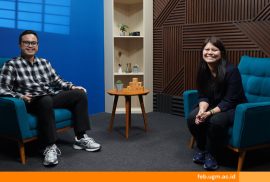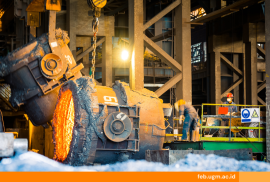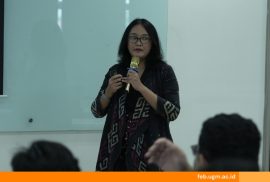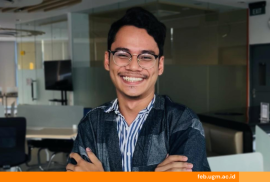Creating a circular and environmentally friendly economic development is one of the Sustainable Development Goals (SDGs) goals. According to Professor Budy P. Resosudarmo, an economics expert from the Crawford School of Public Policy at the Australian National University (ANU), economic development encompasses both economic aspects, human development, and environmental sustainability.
Budy conveyed this during the first session of a lecture series titled “Enhancing the Research Process in Environmental Economics,” organized by the Master’s and Doctoral Programs at the Faculty of Economics and Business, Gadjah Mada University (FEB UGM), on Monday (September 2) at the MD FEB UGM Auditorium.
Budy explained that human development is measured through economy, education, and health. Meanwhile, the goal of sustainable economic growth is reflected in the principles of the 2030 SDGs.
Furthermore, Budy emphasized that the resources and opportunities available today must be managed well so that future generations can enjoy them without harm or burden. “We are allowed to develop and enjoy whatever the world offers as long as our future generations can still enjoy the world as we do today. Therefore, what is emphasized in sustainable development is intergenerational equity, not equality where each generation gets the same amount,” Budy explained.
Budy also introduced the triple bottom line concept, an accounting framework that measures an activity’s social and environmental impact on a company’s financial performance. According to him, every policy and development project must fulfill this concept, which consists of economic growth, human well-being, and environmental sustainability. However, Budy noted that ecological sustainability is often easier to implement with added value.
“Most natural resources are common goods, making it difficult to assign economic value to them. Yet, sustainability requires added value and good environmental management capabilities,” he stated.
During the event, Budy also discussed environmental exploitation in Indonesia. Since the New Order era, natural resource exploitation has been the driving force behind economic growth. This allowed Foreign Direct Investment (FDI) to enter and exploit Indonesia’s natural resources. The proceeds from these foreign investments were then used to develop infrastructure within the country. During the New Order era, this economic growth strategy significantly reduced poverty rates by up to 40% in the 1970s. However, as Indonesia’s environmental quality continues to decline, this strategy is no longer effective in promoting economic growth.
“This strategy can no longer work while our resources continue to dwindle and our energy needs rise. We can no longer rely on oil and gas, and renewable energy is limited,” he explained.
Therefore, Budy sees the need for energy transformation in Indonesia. He explained that there are three aspects to energy transformation. Three aspects include increasing the intensity of renewable energy use, regional energy integration, and gradually phasing out the use of non-renewable energy. To support this energy transformation, the government plans to implement a carbon trading system by 2025, build renewable energy power plants, promote electric vehicles in Indonesia, restore mangrove forests, and implement a circular economy.
However, Budy emphasized that energy integration across the country through the development of the Nusantara Super Grid electricity network is vital. This Super Grid will maximize the potential of renewable energy, accelerate decarbonization, and ensure energy stability. Alternatively, Indonesia could connect with China’s Asia Super Grid or Australia’s Super Grid. “Indonesia is in a strategic position. Therefore, the opportunity to connect with renewable energy grids from neighboring countries (China and Australia) is significant,” he explained.
Reportage: Najwah Ariella Puteri
Editor: Kurnia Ekaptiningrum
Sustainable Development Goals










